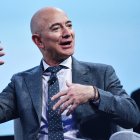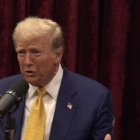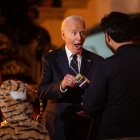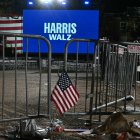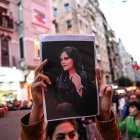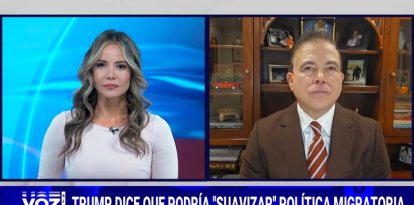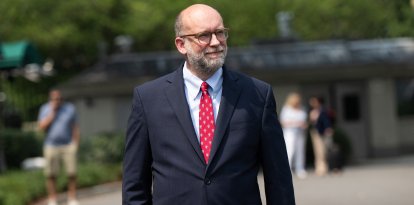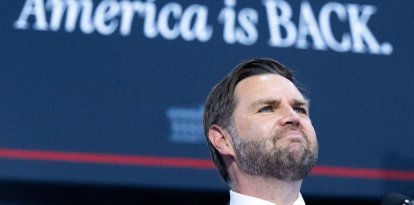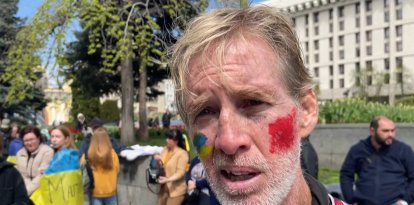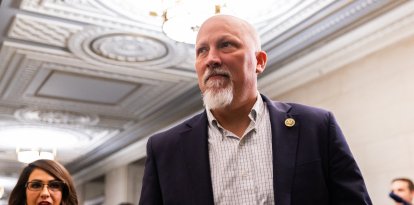ANALYSIS
Trump, Musk, Rogan... the most important people of 2024
From the United States to Moscow, politicians, businessmen, celebrities and criminals who marked the year.

The most important people of 2024
👍 Donald Trump
The president-elect was the undisputed person of the year, even literally named "Person of the Year" by Time and The Financial Times. Trump began the year with a cloudy political and judicial landscape: banned from the ballot in Colorado, in the first few months he was due to go to court for some of the most high-profile lawsuits against him.
Although the polls showed him ahead in the Republican primaries, several well-known contenders in the party still dreamed of snatching the nomination, such as Governor Ron DeSantis or former U.N. Ambassador Nikki Haley. Some analysts even pointed out that they were competing for a second place, hoping that Trump's candidacy would be blocked nationwide.
Little by little, the path was cleared. In a landmark ruling, the Supreme Court ruled that Colorado could not remove the former president from its ballot. His landslide victory in the Iowa caucus, the first contest of the GOP primary, confirmed his status as the front-runner.
In a campaign littered with iconic moments, such as the live meltdown of Joe Biden during the presidential debate or the surprising and viral image of the Republican dressed in McDonald's apron, there is one that stands out as a photo of the race (and perhaps of the year): Trump, ear bloody, raising his fist and chanting, "Fight, fight, fight!"
Trump culminated his return to power on Nov. 5, taking everything: the Electoral College, the Senate and the House. And along the way, all the swing states and the popular vote. "An unprecedented and powerful mandate" was how he defined it himself in his first speech as president-elect.
The Supreme Court's decision on presidential immunity and his election victory eased the president's judicial situation, with the dismissal of cases brought by special counsel Jack Smith for election interference and withholding classified documents.
👍 Elon Musk
Among space milestones, a unparalleled personal fortune, a triumphant breakthrough into American politics, it's been a busy year for Musk.
"I fully endorse President Trump and hope for his rapid recovery [from his first assassination attempt]." With that sentence (an X post, of course) the entrepreneur consummated in July his veer toward Trumpism. Formerly a Democratic voter, he began trending toward the GOP at least four years ago. In the 2022 midterm elections, he endorsed Republicans. He gradually moved closer, away from the Democrats, until putting his posts, public events and wallet behind Trump.
In addition to launching a super PAC which, true to his showy and innovative personal style, organized a daily raffle for $1 million among petition signers, toured the swing state of Pennsylvania from auditorium to auditorium and donated more than $200 million to help reelect Trump, according to Forbes estimates.
Next year he will headline his own government department and will be able to exercise (if nothing changes) soft power over the president as First Buddy, a jocular title attributed to him by the press that he himself adopted.
👍 Joe Rogan
"The Joe Rogan Experience" continues to reign supreme in the podcast world. It was the most listened to of the year in the U.S. and the world on Spotify. It is the fifth time it has topped this list nationally.
Earlier this year, Rogan renewed his contract with the audio platform for $250 million and managed to end the exclusivity, allowing him to distribute the program through more channels. In August he released a special on Netflix, "Joe Rogan: Burn Your Boats."
In August, he dove into the presidential election and endorsed Donald Trump, a radical departure from his endorsement of Bernie Sanders in 2020.
👍 Robert F. Kennedy Jr.
The nephew of former President John F. Kennedy began the year as independent candidate, dreaming of stepping back into his uncle's shoes and completing his father's truncated campaign. He felt pushed out of the Democratic Party, where he first tried to challenge Biden for the nomination.
He began to feel more hostility from Democrats than Republicans. Robert F. Kennedy Jr.'s former party tried to block his candidacy, and even called on several members of the dynasty to repudiate him.
After months of speculation with both parties pining for his independent vote share, in August he suspended his campaign and went all in for Trump, actively campaigning for the Republican.
By a different route than imaginable earlier this year, RFK Jr. will return the historic last name to the top of American politics if the Senate confirms him as health secretary.
👍 Benjamin Netanyahu
The prime minister surpassed a year at the helm of Israel's military response to Oct. 7. In addition to advancing in Gaza, under his command, the Israeli troops raided Lebanon, from where the terrorist group Hezbollah was firing on the Jewish state. Since then, he eliminated the terrorist group's top leadership several times.
It was a year fraught with obstacles for Netanyahu: internal protests, warm support from the Biden administration and a arrest warrant from the International Criminal Court (ICC).
👍 María Corina Machado
The veteran politician solidified her role as the face of the struggle against the regime of dictator Nicolás Maduro, a position she achieved last year by dominating the opposition primaries.
Banned from participating in this year's general election, in March she chose to cede her place at the head of the unified opposition ballot to Corina Yoris, an academic. The electoral authority, a puppet of Maduro, prohibited her registration as well. Machado then endorsed diplomat Edmundo González, who obtained a majority of the votes in the election. The regime tried to falsify the results, but in a coordinated effort at the local and national level, the opposition managed to collect and publish the ballots showing González as president-elect.
"She is an extraordinary woman with an enormous capacity for work," González Urrutia described her in exclusive conversation with VOZ, even offering her the vice presidency. "She is the fundamental leader of this political process we started." From the underground, the Venezuelan politician continues to lead the opposition movement with the next major flashpoint on Jan. 10, when González must assume the presidency despite threats from Maduro, who says he will remain in office.
👍 Yulia Navalnaya
Following the death of her husband, dissident Alexei Navalny, in a Russian prison earlier this year, Yulia Borisovna Navalnaya took over as head of the Anti-Corruption Foundation.
Also at the head of the Russian opposition: "I will participate in the elections… as a candidate," she told the BBC in October. Thus, Russia's "future first lady," as she was informally known in related circles, said she will take the place of Alexei as "future president", as he was called.
This year, a Moscow court ordered her arrest for alleged "participation in an extremist organization." She lives in exile.
👍 Javier Milei
The libertarian economist passed the one-year mark as president of Argentina, a cycle that VOZ commentator Leandro Fleischer describes as one "more hits than misses."
He fulfilled some of his star promises. He managed to lower inflation, one of the scourges that most worries Argentines, stabilized the price of buying dollars and reduced public spending. Polls show a favorable image among most Argentines.
He also strengthened his global position as a conservative leader, both in international events and in multinational organizations and clashes with leftist leaders, such as Venezuelan dictator Nicolás Maduro. His closeness to Donald Trump could further cement this stance next year.
👎 Joe Biden
It was the year of the landslide. His shaky reelection campaign ended up crumbling in the disastrous presidential debate, which soon after led to surrendering the Democratic nomination.
The doubts about his health status, high inflation, the border crisis and the woke agenda marked his last year in office. Trump's victory in November sealed his bad year, and could tarnish his entire legacy: Biden ran in 2020 as the anti-Trump candidate. After getting to know Biden four years, Americans turned back to Trump.
The pardon of his son, Hunter Biden, in the final stretch of his administration further dented his image in the eyes of Americans.
👎 Kamala Harris
The vice president experienced her best and worst political year. In July, she stepped forward and accepted the Democratic nomination after the "coup" against Biden.
Her team had to go out to introduce her to an electorate that, to a large extent, knew only her title of second in command of the government (and did not like her much either: She was the most unpopular vice-president in modern history).
The question of who Kamala Harris is shed light on her role as border czar and her progressive measures as an attorney general and senator. Despite a good (albeit controversial) performance in the only debate against Trump, she stumbled in interviews, especially with friendly media outlets, and she unsuccessfully tried to detach herself from the Biden administration, among other mistakes. After her defeat, she vanished from the public stage.
There are reports that she intends to run for governor of California or the 2028 presidential election, an idea that seems to please a majority of the Democratic electorate.
👎 Jack Smith
The special prosecutor saw his two-year job fall apart in a few months. Appointed by Attorney General Merrick Garland, he was handling a case against Trump for election interference in 2020 and another for withholding classified material.
He suffered several setbacks. He had to dilute his interference charge after the Supreme Court ruled in favor of presidential immunity and the documents case in Mar-a-Lago documents was dismissed after the judge found he was illegally appointed (although appealed, the ruling was never heard).
A month before the election, he himself was publicly accused by Republicans of meddling in the election. The Justice Department opened an investigation to assess whether his team violated any rules in prosecuting the president-elect.
Following Trump's victory at the polls, the U.S. attorney called for the dismissal of both cases on the grounds that his office cannot investigate a sitting president.
👎 Thomas Matthew Crooks and Ryan Wesley Routh
These two tried to subvert the democratic process with bullets. This fact unites two otherwise very different men: Thomas Matthew Crooks, 20, low-profile, a native of Bethel Park, Pa., and Ryan Wesley Routh, 58, a Hawaii resident with a long criminal history.
Crooks died during his Butler, Pa., attempt, shot by a sniper, while Wesley Routh was formally charged with attempted murder.
👎 Diddy Combs
His name became toxic. Celebrities and politicians deny knowing him, and he finds himself behind bars as complaints against him pile up.
In March, authorities raided his homes. Lurid details of his alleged crimes, which have been emerging throughout the year, led to comparisons to Jeffrey Epstein. In 2025, he will face trial for human trafficking.
👎 Luigi Mangione
Unknown until the last month of the year, he became one of the most notable people of the year when he became the prime suspect in the murder of UnitedHealthcare CEO Brian Thompson. He faces state and federal charges, with capital punishment the maximum possible penalty.
Some progressive circles hailed him as a hero for his attack on a top executive of a health insurer, which they blame for poor service. Even some progressive lawmakers portrayed the crime as a "wake-up call."
👎 Justin Trudeau
Poor results in the polls, forced cabinet changes and the admission of errors in immigration policy have been some of the blows that have eroded Trudeau's position at the helm of Canada.
In 2025, he will have to navigate a rough relationship with Donald Trump's United States and an election that could end his leadership, as he must call a vote before the end of October 2025.
👎 Olaf Scholz
The coalition between the Greens, Liberals and Social Democrats that kept Scholz in the chancellery blew up in November. The instability of his government contrasted with that of his predecessor, Angela Merkel, who completed 16 years in power.
In addition, the chancellor's government was bruised by economic and international challenges, most notably his support for Ukraine in the war and the return of Donald Trump, which calls into question trade relations with the United States.
In December, he lost a confidence motion in parliament.
👎 Ali Khamenei
Iran's ambitions for regional hegemony suffered serious blows. From the successful Israeli military efforts to weaken Iran's pawn network, comprising Hamas in Gaza, Hezbollah in Lebanon and the Houthi rebels in Yemen, among others, the final blow was the fall of Iran's ally Bashar al-Assad in Syria.
The electoral victory of Trump, a staunch enemy of the Iranian regime, further worsens Khamenei's prospects for the coming year.
Behind closed doors, the economic-energy crisis continued to worsen and, despite the crackdown, protesters continued to find avenues to protest against the Islamic dictatorship.
👎 Vladimir Putin
At the beginning of the year, Russia held a presidential election with an anticipated result: Putin reelected for another six years. The polls, with leading contenders banned and tight control at polling stations, were widely protested by the opposition.
The war escalation in Ukraine continued, including with the collaboration of North Korean troops on the ground and threats to resort to its nuclear arsenal. At his annual press conference, he expressed readiness to meet with Trump, who promised to end the European conflict.





